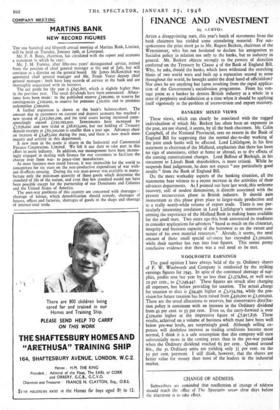FINANCE AND INVESTMENT
8) t .USTO
AFTER a disappointing start, this year's batch of statements from the bank chairmen has yielded some stimulating material. For out- spokenness the prize must go to Mr. Rupert Beckett, chairman of the Westminster, who has not hesitated to declare his antagonism to Socialist policy in relation not only to the banks, but to industry in general. Mr. Beckett objects strongly to the powers of direction conferred on the Treasury by Clause 4 of the Bank of England Bill. Why, he asks, should the banks, which have withstood the searching blasts of two world wars and built up a reputation second to none throughout the world, be brought under the dead hand of officialdom? Nor does he see anything but harm resulting from the rapid applica- tion of the Government's socialisation programme. From his van- tage point as a banker be detects British industry as a whole in a state of perplexity and indecision at a time when it should be applying itself vigorously to the problem of reconversion and export recovery.
BANKERS' MIXED VIEWS
These views, which can clearly be associated with the rugged individualism of which Mr. Beckett has often been an exponent in the past, are not shared, it seems, by all the bank chairmen. Mr. Colin Campbell, of the National Provincial, sees no reason in the Bank of England Bill for supposing that the normal day-to-day working of the joint stock banks will be affected. Lord Linlithgow, in his first statement as chairman of the Midland, emphasises that there has been no sign of uneasiness, either at home or abroad, as to tl,e effects -of the coming, constitutional changes. Lord Balfour of Burleigh, in his statement to Lloyds Bank shareholders, is more critical. While he suspends final judgement, he does not expect "any particularly good results" from the Bank of England Bill.
On the more workaday aspects of the banldng situation, all the statements bear witness to a recent increase in the activities of their advances departments. As I pointed out here last week, this welcome recovery, still of modest dimensions, is directly associated with the present reconversion phase in British industry. It should gain momentum as this phase gives place to larger-scale production and to a really worth-while volume of export trade. There is one par- ticularly interesting revelation in Lord Linlithgow's statement con- cerning the experience of the Midland Bank in making loans available for the small man. Two years ago this bank announced its readiness ro consider applications for advances " based as much on the character, integrity and business capacity of the borrower as on the extent and nature of his own material resources." Already, it seems, the total amount of these small special advances has exceeded L1,500,000, while their number has run into four figures. This seems pretty conclusive evidence that there was a real need to be met.
WOOLWORTH EARNINGS
The good opinion I have always held of the 5s. Ordinary shares of F. W. Woolworth 'and Company is reinforced by the striking earnings figures for 1945. In spite of the continued shortage of sup- plies, profits rose last year by no less than £1,379,802, or well over 20 per cent., to £7,249,447. These figures are struck after charging all expenses, but before providing for taxation. The actual harge for taxation to date is £94,495 higher at £3,154,294, while the pro- vision for future taxation has been raised from £45o,000 to Li,oco,oco. There are the usual allocations to reserves, but conservative distri,bu- tion policy is consistent with an increase in the Ordinary dividend from 45 per cent. to 55 per cent. Even so, the carry-forward is over L520,000 higher at the impressive figure of £7,917,836. These results, achieved on a volume of business which must have been well below pre-war levels, are surprisingly good. Although selling ex- penses will doubtless increase as trading conditions become more normal, I think it is a safe assumption that this company will earn substantially more in the coming years than in the pre-war period when the Ordinary dividend reached 65 per cent.. Quoted around 86s., the 5s. Ordinary units are yielding only 31 per cent, on the 55 per cent. payment. I still think, however, that the shares are better value for money than most of the leaders in the industrial market.






























 Previous page
Previous page